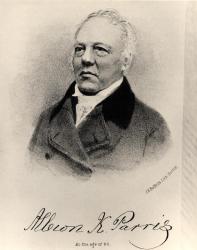(Page 9 of 9) Print Version
Maine Historical Society and reckoning with museums as colonial institutions
Collecting the State of Maine
Maine Historical Society (MHS) was founded in 1822 on Wabanaki Homelands. It is the third oldest state-dedicated historical organization in the United States. The founders were 49 White men—18 of them also were involved in Maine's push for statehood in 1820. The mission they established was,
To collect and preserve as far as the state of their funds will admit, whatever, in their opinion, may tend to explain and illustrate any department of civil, ecclesiastical, and natural history, especially in this State, and of the United States.
The "opinion" of the people who have led MHS, which was limited to affluent White men for more than half of our history, has driven what MHS has collected over the past 200 years. Their passions, interests, blind spots, and prejudices shaped what was collected, whose stories were saved, whose weren't, and determined the types of history we can display today. We acknowledge that history only told by White authors with a White gaze continues White power and supremacy.
Initially, MHS focused on preserving the memories and documents of settlers, and state founders. Examples include the Pejepscot and Kennebec Proprietor's collections, which document the acquisition and distribution of Maine land by European settler colonialists, or the portraits of MHS's founders.
While MHS collections have grown to include a broader representation through journals, ledgers, maps, treaties, business records, diaries, family papers, photos, ephemera, fine art, clothing, artifacts, and much more, there are still significant gaps.
From MHS's founding to the mid 20th century, collecting at our institution reflected the social and cultural norms of the moment—there was little interest in collecting the experiences of women, the Wabanaki people who had lived here for over 13,000 years, ethnic minorities like the Irish, Italians, Franco, Jews, Chinese, or Black people who have been part of the Maine story since the arrival of the first Europeans. Still, if you look, even those stories can be found—in bits, pieces, and telling ways—in MHS's earliest and most "yankee" collections.
—Steve Bromage, Executive Director Maine Historical Society
Who is Missing?
For centuries, leadership at Maine Historical Society and political positions like the governor's office have been held by White men.
Missing Image
Jamie Kingman Rice
Museums are settler colonial institutions
As Maine Historical Society enters its third century, it is an ideal opportunity to reflect on how we got here. Our path is part of an industry-wide introspection, geared toward a better understanding of how cultural collections are built in the first place, and how current generations are impacting the future.
MHS, like other storied institutions, is somewhat beholden to the collecting efforts of our predecessors. Archives and museums are colonial structures by nature, and one founded on the principle of preserving the history of what is now known as Maine is—by definition—colonial. Reckoning with this we ask, How can we build collections that are more representative of Maine?
However, there is more to cultural stewardship than the next acquisition on the horizon. How can we as historians, researchers, archivists, and curators draw attention to diverse stories and perspectives already inside the historic record as it exists at MHS? Working in collaboration with stakeholders and communities outside of our institution to reevaluate collections, reinterpret materials, and revisit the accepted past with a fresh perspective is fundamental to a more inclusive understanding and must be done in conjunction with adding to the collections themselves.
Providing increased access to collections, welcoming new interpretation and listening to new perspectives is how history informs the present. History is not finite, and while the holdings in 200 year-old repositories like Maine Historical Society skew towards privileged aspects of our past, they can still teach us how to create a better future.
—Jamie Kingman Rice
Director of Collections & Research, Maine Historical Society
Friendly URL: https://www.mainememory.net/exhibits/beginagain




























